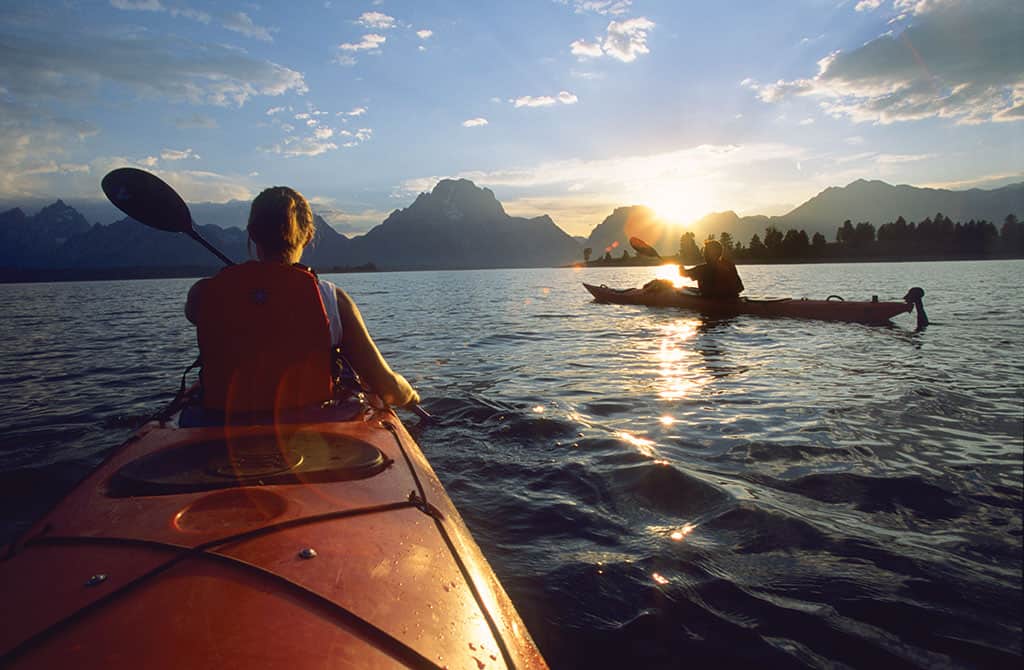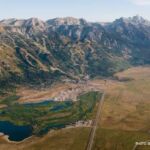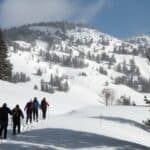Read The
Current Issue
Life on the Lake
Jackson Lake is a jewel for recreationalists, whether they’re looking to catch fish or a wild ride.
By Molly Absolon

Jackson Lake shines like glass as we motor away from the Signal Mountain boat ramp. Four of us lounge on white-cushioned benches, leaning back in the sun, straw hats protecting our faces. As we leave the no-wake zone, AJ Cargill ramps up the engine. The boat kicks back, its bow lifting and speeding us away from shore. We clamp down on our hats and smile. The boat feels powerful and fast.
I haven’t waterskied—or even been in a motorboat—for decades. Most of my experience with Jackson Lake involves driving or biking by. I’ve been to a wedding at Jackson Lake Lodge, but aside from that, this lake and its world of boaters are a mystery to me. I’m more of a mountain girl.
But Jackson is a mountain town with water. All summer, Jackson Lake is busy with boats. On the bright August day I’m out, motorboats haul skiers, surfers, and wakeboarders; fishing boats trawl the deep water; windsurfers and sailboats catch the erratic breezes that pour down the canyons; and kayakers paddle to lakeside camps for wilderness adventures, all in the hulking shadow of Mount Moran.

One of the largest alpine lakes in the country, Jackson Lake is unique not only for its 1) spectacular setting at the foot of the Tetons, but also because 2) it is a lake inside a national park that 3) allows a variety of boats. Yellowstone Lake, about an hour north of Jackson Lake, is in a national park—Yellowstone—and allows the same variety of boats as Jackson Lake, but lacks the stunning scenery. Lake Tahoe, on the California/Nevada border, is surrounded by mountains but ringed by roads, so there’s never any sense of wildness. (Also, it’s not in a national park.) Perhaps closest to Jackson Lake in terms of uniqueness is Utah’s Lake Powell. Yes, it has houseboats full of partiers, but the heart of the Glen Canyon National Recreation Area also has secluded beaches and remote side canyons that feel spectacularly wild. With red rock cliffs instead of hulking granite peaks, though, Lake Powell’s beauty is completely different than Jackson Lake’s. And we’re partial to Jackson Lake’s brand of beauty.
There’s a waiting list to get a mooring, whether for a motorboat or sailboat, at any of the three marinas on Jackson Lake. Laurie Thal waited eight years for her buoy at Leeks Marina. “When my name came up, I found my boat, a twenty-two-foot O’Day I named Pegasus,” she says. Thal also has a Laser 2. “I’ve had it for twenty-five years. It’s a fast and fun boat, also wet and wild on Jackson Lake. It’s small enough I don’t need a buoy for it; it’s easy to trailer. The O’Day is better for kids, family, and wine and cheese. I couldn’t have Pegasus without a buoy.”
Leeks Marina has 125 buoys for rent; Colter Bay has eighty-six slips and 38 buoys, and Signal Mountain has 45 buoys. In total, Jackson Lake has 294 moorings. People without a mooring trailer their boats in for the day.

Paul Bruun has been fishing Jackson Lake for more than forty years. He travels the country, and the world, in pursuit of fish, and Jackson Lake is near and dear to his heart. He likes to be one of the first boats on the water when the ice goes out—May or June, depending on the year.
“The ice comes off rather quickly and is an amazing event to be part of,” he says. “I’ve been trapped when ice floes were piled up by the wind into the Signal Mountain boat ramp and I had to get out and wade, pulling my boat into the ramp. Other times we’ve crunched through the ice and fished and then looked around and suddenly the lake, or most of it, was clear. It’s magical.”
Bruun has seen bears and moose swimming in the lake, plus countless geese, eagles, loons, pelicans, and ducks. Most impressive, though, are the fifty-pound lake trout. “A fish that size is more than twenty-five years old because of the short growing season here,” he says.
Despite giant fish and myriad user groups, it’s easy to find your own piece of paradise on the lake.
“You often feel as if you have the place to yourself,” says Ben Hammond, who moors his boat, Caroline, at Leeks. Hammond started boating on Jackson Lake after his father gave him a wooden motorboat he’d built by hand as a young man. A nineteen-foot cabin cruiser, Caroline draws lots of stares and comments because of its age and polished mahogany hull. Hammond remembers camping on the boat as a kid. Now he takes his own boys out on it.
“The boat is such a magnet,” Hammond says. “Friends love to come out with us. Water sports are part of it, but part of it is just being out on the water. Jackson Lake is an unbelievable resource.”
Cargill, a former World Extreme Skiing champion who grew up puttering around Lake Michigan with her family, steers us toward a sheltered band of water on the lee side of one of the fifteen islands dotting the lake and pulls out the water skis. After coaching us on the intricacies of driving a skier around the lake, she prepares to demonstrate the skiing part, lowering herself into the water and grabbing hold of the rope. The boat inches forward until the rope grows taut. Cargill nods, the driver accelerates, and the boat roars to life. Zero to sixty in seconds. At least that’s what it feels like. Cargill rises out of the water fluidly, her hair still dry, though water drips off her skin and glitters in the sunlight. She carves her way across the wake, extending her outside arm gracefully to balance. Curving back around, she flies back and forth behind us. We race along the shoreline with her in tow until she decides she has had enough. Letting go of the rope, she slowly sinks into the lake, a grin plastered across her face. We arc around and pick her up. Now it’s my turn.
I anxiously move to a platform at the rear of the boat to put on the skis. Cargill slalomed gracefully on one ski, but, as a rookie, I opt for two. The bindings are tight. To help get my feet in, Cargill hands me dishwashing soap. It works. Skis secured, I slip into the water and grab the handle of the tow rope. Cargill starts to move the boat forward, tightening the rope between us. The rope taut, she yells, “Keep your eyes up and just stand up. Are you ready?” I respond, “Ready.”
The boat roars and the rope goes taut, pulling me up from my sitting and floating position and onto my feet. Surprisingly, I’m up on my first try. I smile and attempt to relax as I tear through the wake’s white pathway. My friends in the boat cheer and throw their arms up in encouragement.
As I grow more comfortable, I venture out of the wake, quickly gaining confidence in my ability to remain on my feet. I even begin to look around. The water glistens. The Tetons are everywhere, but I’m miles and miles away from the Jackson Hole I know.
“You get out on the boat and you leave everything behind,” Cargill says. “It’s another world out on the water.”
But Jackson Lake isn’t just about water. There are no hiking trails on the western shore of the lake. The shoreline itself is about 30 miles, and then there are the canyons above it—Snowshoe, Waterfalls, Colter, and Webb. “We use the boat to access the northern Tetons,” Hammond says. “No one goes there. It’s hard to get to that part of the range without a boat, so it has a really wild feeling.”
Upwards of a dozen campsites, accessible only by boat—or by very determined bushwhackers—dot the lake’s western shore. There are also campsites on Elk Island, the largest island in the lake (and also the largest island in the state of Wyoming). “We take everything out to the campsite and set up, then spend the day skiing and hanging out on the boat,” says Steve Whitney, who grew up near Lake Winnipesaukee in New Hampshire and learned how to drive a boat before a car. “When the sun starts to go down, we go back to camp for the night. It’s incredibly relaxing and peaceful.” In a wild way.
Whitney, Cargill, and a friend once shared a camp with a grizzly bear. “The bear was a few hundred yards away, munching on huckleberries,” Whitney says. “We made tons of noise before we landed, and it just ignored us and kept eating. We decided to go ahead and camp since it seemed to have no interest in us. When we woke up in the morning, it was still there, eating away. I slept great that night, but I don’t think the ladies did.”

Laurie Thal spends nights on Pegasus as well. Thal, a glassblower, has moored her sailboat at Leeks Marina for fourteen years. She came to Jackson to enjoy the mountains but, having grown up sailing, hauled her Sunfish on the roof of her Plymouth Valiant all the way from Ohio when she moved here in 1975. She quickly settled into a summer routine that included long days at the lake as well as in the high peaks.
Two years ago Thal and partner Dan Altwies spent seven weeks sailing island-to-island in the South Pacific, from Townsville, Australia, to the Louisiade Archipelago, Papua New Guinea. She has also sailed in Greece, the Caribbean, and Croatia. “Sailing on Jackson Lake isn’t easy,” Thal says. “It’s not like some places that have consistent winds. On Jackson Lake you can have calm one minute and a squall the next. Strong winds come down the canyons. It’s pretty exciting out there.”
While the winds, along with Cargill and Whitney’s skiing antics—in middle school Whitney joined a ski team and eventually his job was to be the top of a three-level pyramid on skis; he’s managed to pull off a two-level pyramid on Jackson Lake—are anything but calm, it’s appreciation of the lake’s peace and quiet that its various user groups have in common. Thal often takes friends out for after-work hors d’oeuvres and drinks. “I love being on the boat, whether it’s super-windy and exciting and the lake is fierce, or when it’s mild and I can just relax with friends and enjoy the scenery and a good glass of wine,” she says.
“What’s the allure?” Whitney asks. “It’s the calm mornings up on the lake. The sun’s out, the sky’s clear. You’re just out floating, looking at the Grand, taking turns skiing with friends, trying new tricks, challenging yourself, and getting better. But camping is really what I enjoy the most. It’s calm, peaceful, and quiet.”

I’m not camping, but we stay for sunset, the sun disappearing behind the peaks, illuminating them from behind and shooting rays of light down the canyons. Cliffs high on the face of Mount Moran catch pockets of sunshine and glow pink as the light fades. The water, which had grown choppy over the course of the day, is again smooth. Even though the day is ending, a number of motorboats are just launching—or possibly re-launching. (While sailors prefer afternoons, when winds usually kick up, motor boaters and kayakers prefer mornings and evenings, which are usually calm.)
“Jackson Lake is the crown jewel of the boating world in terms of scenery. Where else can you waterski with Mount Moran towering over you?” Whitney asks.
That’s a Fact
Jackson Lake is one of the largest and deepest high-altitude lakes in the United States. It sits at 6,772 feet above sea level, is up to fifteen miles long and seven miles wide, and in places is more than 400 feet deep. It is dotted with over fifteen islands, including the largest island in the state of Wyoming, Elk Island.
Jackson Lake at Work
Glaciers pouring out of the Tetons dammed the area’s streams and rivers with their moraines and formed the lakes—Jackson, Jenny, Phelps, Bradley, Taggart, and Leigh—along the eastern edge of the Teton Range. In 1907, a log-crib dam was built across the outlet of Jackson Lake to raise the lake and provide water for irrigation downstream. This dam washed out in 1910 and was replaced by a concrete barrier built between 1911 and 1916. The dam was upgraded between 1986 and 1989 after studies indicated it could fail in an earthquake of 5.5 magnitude or greater.
Before the first dam was constructed in 1907, Jackson Lake had a surface area of 17,800 acres. The current Jackson Lake Dam raised the level of the lake by thirty-nine feet and increased the surface area of the lake to 25,540 acres. The dam impounds 847,000 acre-feet of water at full pool to irrigate farmlands in Idaho, although this role became less important after the construction of the Palisades Dam near Alpine in 1957.
Get Out
Kayaks, canoes, and motorboats can be rented at the Colter Bay Village Marina. Signal Mountain Marina and Leeks Marina rent all of those craft, plus pontoon boats and deck cruisers. All rentals are first-come/first-served.
Motorized boats can be rented by the hour or the day. Prices vary according to the size and type of boat, but start as low as $42 per hour for a basic fishing boat (with a two-hour minimum) and go up to $129 per hour for a deck cruiser that can carry ten people. Day rates range from $185 for a fishing boat to $675 for a deck cruiser. Depending on the year, the boating season runs from mid-May through mid-September, but it’s a good idea to call ahead to check conditions. In some years the ice isn’t off the lake until well into June.
Buoys/gas
—
If you have your own boat, Signal Mountain and Leeks marinas rent buoys for overnight stays and sell gas. Gas can also be purchased at Colter Bay Marina.
Guided trips
—
Prefer someone else do the driving? Signal Mountain Lodge offers half- and full-day fishing trips on the lake. Colter Bay also has fishing excursions as well as lake tours, including a ninety-minute narrated boat ride and breakfast or dinner cruises that stop at Elk Island.
Signal Mountain/Leeks Marina: 307/543-2831; signalmountainlodge.com/boat-rentals
Colter Bay Marina: 307/543-2811; gtlc.com





